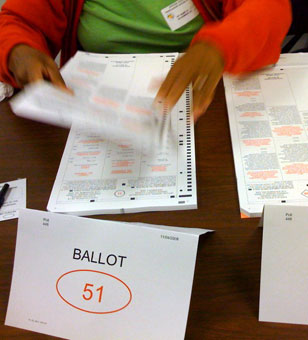The Justice Department ordered Florida’s elections division to halt a systematic effort to find and purge the state’s voter rolls of non-citizen voters.
Florida’s effort appears to violate both the 1965 Voting Rights Act, which protects minorities, and the 1993 National Voter Registration Act – which governs voter purges – T. Christian Herren Jr., the Justice Department’s lead civil rights lawyer, wrote in a detailed two-page letter sent late Thursday night.
State officials said they were reviewing the letter. But they indicated they might fight DOJ over its interpretation of federal law and expressed frustration that President Barack Obama’s administration has stonewalled the state’s noncitizen voter hunt for nine months.
“We are firmly committed to doing the right thing and preventing ineligible voters from being able to cast a ballot,” said Chris Cate, spokesman for Secretary of State Ken Detzner, who was ordered by Gov. Rick Scott to conduct the search for potentially ineligible voters.
DOJ’s written demand came hours after the agency refused to comment on the matter to The Miami Herald. It also followed a federal court ruling Thursday that struck down a Republican voter-registration law that a judge found too onerous.
So far, Florida has flagged 2,700 potential noncitizen voters and sent the list to county elections supervisors, who have found the data and methodology to be flawed and problematic. The list of potential noncitizen voters – many of whom have turned out to be lawful citizens and voters – disproportionately hits minorities, especially Hispanics.
About 58 percent of those flagged as potential noncitizens are Hispanics, Florida’s largest ethnic immigrant population, a Miami Herald analysis found. Hispanics make up 13 percent of the overall 11.3 million active registered voters.
Independent voters and Democrats are the most likely to face being purged from the rolls. Republicans and non-Hispanic whites are the least likely.
Under the Voting Rights Act, Florida needs federal approval before it makes changes to voting because five Florida counties – Monroe, Hillsborough, Collier, Hardee and Hendry – had minority-voting troubles decades ago
“Our records do not reflect that these changes affecting voting have been submitted to the United States District Court for the District of Columbia for judicial review or to the Attorney General for administrative review as required by Section 5 of the Voting Rights Act,” Herren wrote.
“Accordingly, it is necessary that they either be brought before that court or submitted to the Attorney General for a determination that they neither have the purpose nor will have the effect of discriminating on account of race, color, or membership in a language minority group under Section 5.”
He gave the state until next Wednesday to inform the Justice Department of its planned course of action.
“Specifically, please advise whether the State intends to cease the practice discussed above, so that the Department can determine what further action, if any, is necessary,” Herren wrote.
Herren also said that the National Voter Registration Act bans Florida’s effort because it says “a State shall complete, not later than 90 days prior to the date of a primary or general election for Federal office, any program the purpose of which is to systematically remove the names of ineligible voters from the official lists of eligible voters.”
Florida elections officials have repeatedly said that their efforts comply with all federal laws, which aren’t clearly written. The also say there’s nothing discriminatory or partisan about the effort. It’s simply trying to remove ineligible voters: felons, dead people and noncitizens.
To spot noncitizens, though, the state began comparing voter rolls with a Department of Highway Safety and Motor Vehicle database that contains some citizenship information that the agency collects when people get a state ID such as a driver’s license.
But the citizenship data in many cases is out of date. That is, many people become citizens after they get their ID and then register to vote. But the highway safety database isn’t updated.
As a result, the state has performed its own checking and double-checking and winnowed down a pool of 180,000 potential noncitizens to a list of about 2,700. It is asking the counties to contact the voters by mail. Those who don’t respond within about two months of being contacted could be stricken from the rolls.
A coalition of liberal-leaning civil rights groups complained to the Justice Department and the state about the process, pointing out that it burdens citizens instead of the government.
Cate, the state elections spokesman, said the state will have a full response soon. The agency also seemed to express frustration with the lack of help from the U.S. Department of Homeland Security, which maintains citizenship data but won’t share its database with Florida.
Detzner asked again for DHS help on Thursday.
“We provided information to the U.S. Department of Homeland Security today in hopes that the federal government would help us identify ineligible voters,” Cate said. “While this isn’t a response from DHS as to why they haven’t provided us access to their data, at least we know the federal government knows we take ineligible voters on the voter rolls seriously. We hope the federal government will recognize the importance of accurate voter rolls and support our efforts.”
© 2012 McClatchy-Tribune Information Services. Truthout has licensed this content. It may not be reproduced by any other source and is not covered by our Creative Commons license.
Join us in defending the truth before it’s too late
The future of independent journalism is uncertain, and the consequences of losing it are too grave to ignore. To ensure Truthout remains safe, strong, and free, we need to raise $44,000 in the next 6 days. Every dollar raised goes directly toward the costs of producing news you can trust.
Please give what you can — because by supporting us with a tax-deductible donation, you’re not just preserving a source of news, you’re helping to safeguard what’s left of our democracy.
